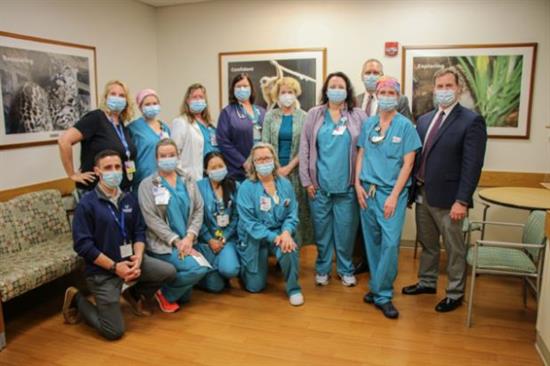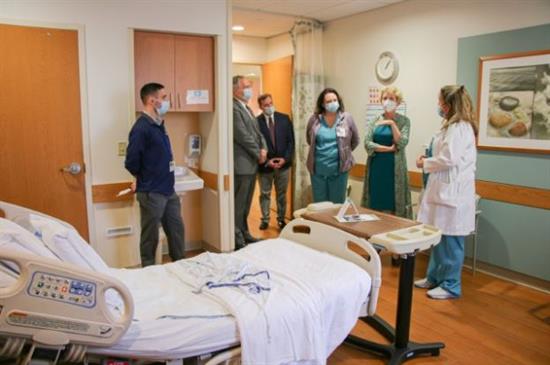Paoli Hospital Visit Inspires Houlahan Legislation to Combat Infant Formula Shortage with Improved Access to Donor Breast Milk
Washington, D.C.,
October 18, 2022
Tags:
Health Care
WASHINGTON, D.C. – Today, Representative Chrissy Houlahan (D-PA) introduced the first-ever bipartisan bill in Congress to improve access to donor breast milk, bettering child health and combating the infant formula shortage. The legislation, called the Access to Donor Milk Act (ADMA), will expand access to and awareness of donor breast milk. She was joined by Representatives María Elvira Salazar (R-FL), and Stephanie Bice (R-OK).
“Today, we took an important step forward for families by introducing a comprehensive bill to improve access to donor breast milk – a safe and vital lifeline for many medically vulnerable infants across this country,” said Houlahan. “We are building a broad coalition of support in the House and Senate, and I will keep working to deliver results for those in need. Especially in the wake of the infant formula crisis, we must be using all of the tools at our disposal to help children and families.”
When Houlahan visited the maternity ward at Paoli Hospital in May, she heard about the value of donor milk for babies with a medical need and the barriers around awareness, regulation, and coverage that prevent this ‘liquid gold’ from reaching infants.
“When Congresswomen Chrissy Houlahan visited Paoli Hospital’s Maternity Unit we discussed the value of Pasteurized Human Donor Milk for medically fragile infants as a low cost invention that saves lives and that this should be reimbursable by insurers. I’m so proud it inspired this legislation,” Donna Sinnott, Lactation Consultant and Doula, and winner of the recent Chester County March of Dimes award.
It was community conversations with Main Line Health medical professionals that inspired Houlahan’s Access to Donor Milk Act, but the support is widespread across industry and on both sides of the aisle down in Congress and comes amidst another baby formula recall in recent days. “Feeding and nourishing our infants should be as easy as possible whether parents use breast milk, formula, or donor milk,” said Rep. Salazar. “As a mother of two beautiful daughters, I am proud to co-lead legislation that will, especially in times of crisis, help suppliers meet demand for safe and healthy donor milk.” “Fortunately, in the Fifth Congressional District, we have the Oklahoma Mothers’ Milk Bank which provides safe pasteurized milk for families,” said Rep. Bice. “For a variety of reasons, not all mothers can breastfeed, which has critical health benefits for young children. This bipartisan legislation will promote healthy families and help mitigate the impacts of any future infant formula shortages.“ What is the Access to Donor Milk Act? The Access to Donor Milk Act (ADMA) would increase federal support for nonprofit milk banks and access to donor milk for medically-vulnerable infants.
The ADMA will:
This bipartisan legislation is endorsed by 17 organizations: "We have witnessed an amazing transformation in neonatal care and improved outcomes here in Pennsylvania due to donor milk. Prior to the opening of our nonprofit milk bank in 2016, only a third of our state's high-level NICUs utilized donor milk and today, we're proud to say that is now 100 percent. Most people don’t know that the non-profit network of milk banks take care of 90% of the NICUs in the US. The NICUs of Pennsylvania turn to us for a safe, ample, and ethically-sourced supply of donor milk for the medically-fragile infants they treat. The Access to Donor Milk Act will provide much-needed support to raise awareness, alleviate access barriers, ensure we can meet increasing demand, and protect this critical medical service in the event of an emergency. We thank Representatives Houlahan, Salazar, and Bice for recognizing the needs of the tiniest, most fragile members of our community," said Denise O'Connor, Founder and Executive Director of Mid Atlantic Mothers' Milk Bank, which serves PA-06 and all of Pennsylvania.
“March of Dimes is encouraged by this legislation to increase federal support for nonprofit milk banks and access to donor milk for the highest-need infants. Breast milk is the best food for babies in the first year of life and helps babies grow healthy and strong, particularly during their crucial first six-months of life. This bill will continue to knock down barriers impacting parents who choose to breastfeed their infants. Expanding access, emergency capacity at milk banks, parental awareness and improving safety of donor milk is vital to ensuring that infants have the food they need for their best start at life, particularly during times of emergency and shortages,” said Stacey Brayboy, Senior Vice President, Public Policy & Government Affairs at March of Dimes.
“The infant formula crisis makes plain: we must build an infrastructure for infant nutrition security in the United States. Expanding access to donor human milk is one critical component of that security. We are grateful to Rep. Houlahan, Rep. Salazar, and Rep. Bice for their leadership on this bill, which shows how easily we can leverage existing resources to build the network of nonprofit milk banks the nation’s families deserve,” said Amelia Psmythe Seger, Deputy Director, U.S. Breastfeeding Committee.
"The infant formula shortages faced by millions of families this year exposed how this country's infant feeding priorities are out of step with public health guidance and international norms. Human milk is the optimal source of infant nutrition, but the United States lacks the infrastructure to support sustained breastfeeding and assure access to donor milk, especially for medically fragile infants. This legislation sets the country on the right path by investing in public awareness efforts and leveraging community infrastructure, including WIC clinics, to support donor milk collection, processing, and distribution. We applaud Representatives Houlahan, Salazar, and Bice for their leadership in prioritizing the nutritional needs and the long-term health of America's newborns," said Brian Dittmeier, Senior Director of Public Policy for the National WIC Association (NWA).
"Nonprofit milk banks have an impressive history of both safety and outcomes for the most medically-vulnerable infants. HMBANA thanks Representatives Houlahan, Salazar, and Bice for their focus on the well-being of children and families. We hope that Congress moves swiftly to take up this important piece of legislation to ensure that more families have access to donor milk,” said Lindsay Groff, Executive Director of the Human Milk Bank Association of North American (HMBANA).
“As an extended breastfeeding mom who has nursed for nearly 3 years and had the extraordinary honor and privilege of donating breast milk to a medically vulnerable infant this past summer, I am thrilled about the introduction of the Access to Donor Milk Act. Breast milk is medicine and donor milk increases access to this nutrient-rich first food, which provides immediate benefits to babies and improves their health outcomes across the lifespan. This is the next best step in eradicating the infant feeding crisis while simultaneously promoting breastfeeding and human lactation as a public health imperative. I applaud Congresswoman Houlahan for presenting this investment in breastfeeding that will advance health equity,” said Denys Symonette Mitchell, Director of Policy & Partnerships, National Women’s Health Network.
The full list of endorsing organizations:
Houlahan is an Air Force veteran, an engineer, a serial entrepreneur, an educator, and a nonprofit leader. She represents Pennsylvania’s 6th Congressional District, which encompasses Chester County and southern Berks County. She serves on the House Armed Services Committee, the House Foreign Affairs Committee and the House Small Business Committee. She is the recipient of the U.S. Chamber of Commerce’s Abraham Lincoln Leadership for America Award which “recognizes members who demonstrate the bipartisan leadership and constructive governing necessary to move our country forward” and the Congressional Management Foundation’s 2022 Democracy Award for best Constituent Services in Congress.
### |
Press Releases





